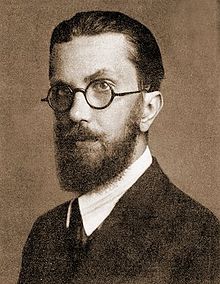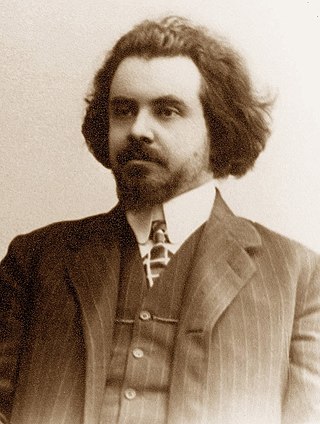
Nikolai Alexandrovich Berdyaev was a Russian philosopher, theologian, and Christian existentialist who emphasized the existential spiritual significance of human freedom and the human person. Alternative historical spellings of his surname in English include "Berdiaev" and "Berdiaeff", and of his given name "Nicolas" and "Nicholas". Russian paleontologist and Christian apologist Alexander V. Khramov attributes his ideas about an atemporal human fall to Berdyaev and Evgenii Nikolaevitch Troubetzkoy.
Alexander Dmitrievich Schmemann was an influential Orthodox priest, theologian, and author who spent most of his career in the United States.

John Zizioulas was a Greek Orthodox bishop who served as the Metropolitan of Pergamon of the Ecumenical Patriarchate of Constantinople from 1986 until his death in 2023. He was one of the most influential Orthodox Christian theologians of the 20th and 21st centuries.
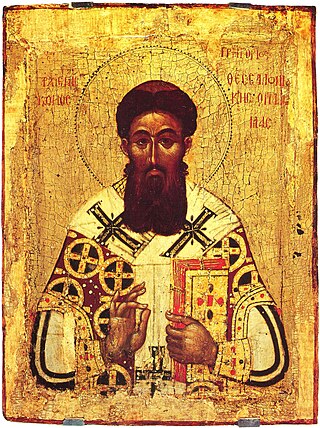
John Meyendorff was a leading theologian of the Orthodox Church of America as well as a writer and teacher. He served as the dean of St. Vladimir's Orthodox Theological Seminary in the United States until June 30, 1992.
John Anthony McGuckin is a British theologian, church historian, Orthodox Christian priest and poet.

In Eastern Orthodox (palamite) theology, there is a distinction between the essence (ousia) and the energies (energeia) of God. It was formulated by Gregory Palamas (1296–1359) as part of his defense of the Athonite monastic practice of Hesychasm against the charge of heresy brought by the humanist scholar and theologian Barlaam of Calabria.

Vladimir Nikolaievich Lossky was a Russian Eastern Orthodox theologian exiled in Paris. He emphasized theosis as the main principle of Eastern Orthodox Christianity.
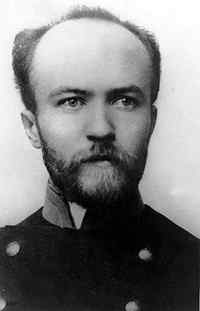
Nikolay Onufriyevich Lossky, also known as N. O. Lossky, was a Russian philosopher, representative of Russian idealism, intuitionist epistemology, personalism, libertarianism, ethics and axiology. He gave his philosophical system the name intuitive-personalism. Born in Latvia, he spent his working life in St. Petersburg, New York, and Paris. He was the father of the influential Christian theologian Vladimir Lossky.
Eastern Orthodox theology is the theology particular to the Eastern Orthodox Church. It is characterized by monotheistic Trinitarianism, belief in the Incarnation of the divine Logos or only-begotten Son of God, cataphatic theology with apophatic theology, a hermeneutic defined by a Sacred Tradition, a catholic ecclesiology, a theology of the person, and a principally recapitulative and therapeutic soteriology.

Kallistos Ware was an English bishop and theologian of the Eastern Orthodox Church. From 1982, he held the titular bishopric of Diokleia in Phrygia, later made a titular metropolitan bishopric in 2007, under the Ecumenical Patriarchate of Constantinople. He was one of the best-known modern Eastern Orthodox hierarchs and theologians. From 1966 to 2001, he was Spalding Lecturer of Eastern Orthodox Studies at the University of Oxford.

Sophrony, known also as Elder Sophrony or Father Sophrony was an archimandrite and one of the noted ascetic Christian monks of the twentieth century. He is best known as the disciple and biographer of Silouan the Athonite and compiler of Silouan's works, and as the founder of the Patriarchal Stavropegic Monastery of St. John the Baptist in Tolleshunt Knights, Maldon, Essex, England.

John Chryssavgis is an Orthodox Christian theologian who serves as advisor to the Ecumenical Patriarch on environmental issues. He is a clergyman of the Greek Orthodox Archdiocese of America. In January 2012, he received the title of Archdeacon of the Ecumenical Throne by His All-Holiness Ecumenical Patriarch Bartholomew. In 2016, he was awarded an honorary doctorate by St. Vladimir's Theological Seminary. In 2020, he was elected Honorary Professor of Theology in the Sydney College of Divinity.

The Catholic Church and the Eastern Orthodox Church have been in a state of official schism from one another since the East–West Schism of 1054. This schism was caused by historical and language differences, and the ensuing theological differences between the Western and Eastern churches.

Olivier-Maurice Clément was a French Eastern Orthodox theologian who taught at St. Sergius Orthodox Theological Institute in Paris, France. He actively promoted the reunification of Christians, dialogue between Christians and people of other beliefs, and the engagement of Christian thinkers with modern thought and society.
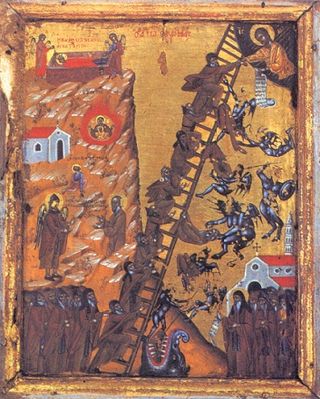
Theosis, or deification, is a transformative process whose aim is likeness to or union with God, as taught by the Eastern Catholic Churches and the Eastern Orthodox Church; the same concept is also found in the Latin Church of the Catholic Church, where it is termed "divinization". As a process of transformation, theosis is brought about by the effects of catharsis and theoria. According to Eastern Christian teachings, theosis is very much the purpose of human life. It is considered achievable only through synergy of human activity and God's uncreated energies.
The history of Eastern Orthodox Christian theology begins with the life of Jesus and the forming of the Christian Church. Major events include the Chalcedonian schism of 451 with the Oriental Orthodox miaphysites, the Iconoclast controversy of the 8th and 9th centuries, the Photian schism (863-867), the Great Schism between East and West, and the Hesychast controversy. The period after the end of the Second World War in 1945 saw a re-engagement with the Greek, and more recently Syriac Fathers that included a rediscovery of the theological works of St. Gregory Palamas, which has resulted in a renewal of Orthodox theology in the 20th and 21st centuries.

20th century Eastern Orthodox theology has been dominated by neo-Palamism, the revival of St. Palamas and hesychasm. John Behr characterizes Eastern Orthodox theology as having been "reborn in the twentieth century." Norman Russell describes Eastern Orthodox theology as having been dominated by an "arid scholasticism" for several centuries after the fall of Constantinople. Russell describes the postwar re-engagement of modern Greek theologians with the Greek Fathers, which occurred with the help of diaspora theologians and Western patristic scholars. A significant component of this re-engagement with the Greek Fathers has been a rediscovery of Palamas by Greek theologians; Palamas had previously been given less attention than the other Fathers.
The position of the Eastern Orthodox Church regarding the Filioque controversy is defined by their interpretation of the Bible, and the teachings of the Church Fathers, creeds and definitions of the seven Ecumenical Councils, as well as the decisions of several particular councils of the Eastern Orthodox Church.
The Russian Religious Renaissance was a period from roughly 1880 -1950 which witnessed a great creative outpouring of Russian philosophy, theology and spirituality. The term is derived from the title of a 1963 book by Nicholas Zernov called, The Russian Religious Renaissance of the Twentieth Century. The renaissance began in the late nineteenth century but was unexpectedly driven out of Russia due to the violent upheavals of the Bolshevik Revolution and early atheistic Communist regimes. This dislocation led to the resettlement of many Russian intelligentsia in Europe and the West where the renaissance reached its full expression. Although often viewed as a development within the Russian Orthodox world, the spiritual ideals of the Russian Religious Renaissance were carried throughout the wider Eastern Orthodox Church and even into the Roman Catholic and Protestant communities.
